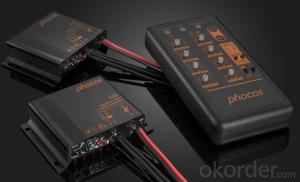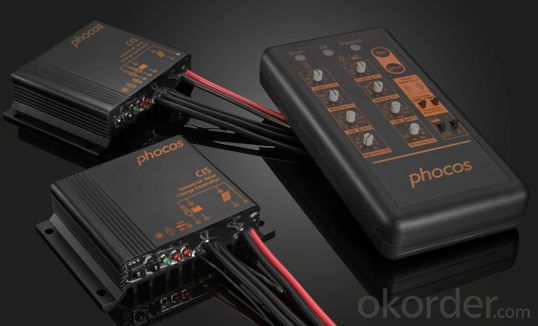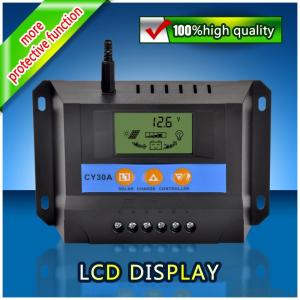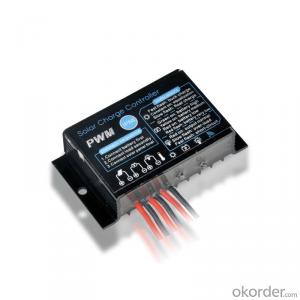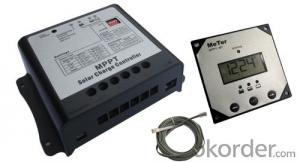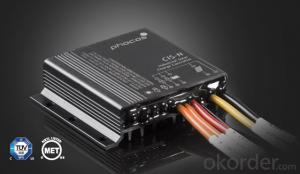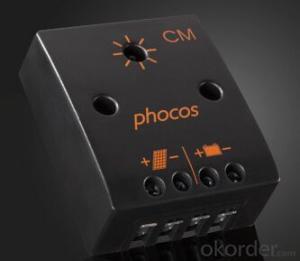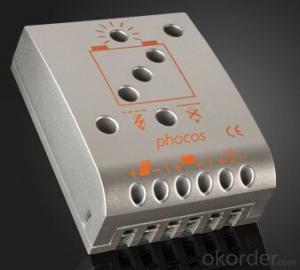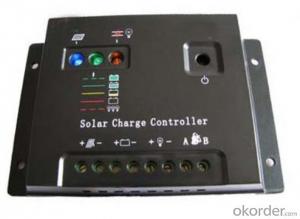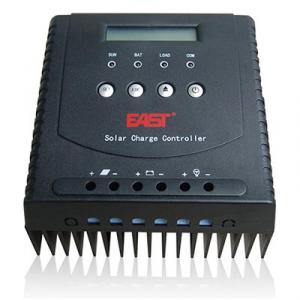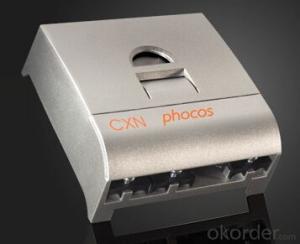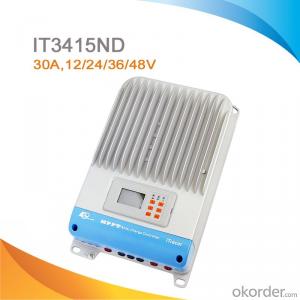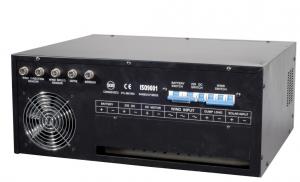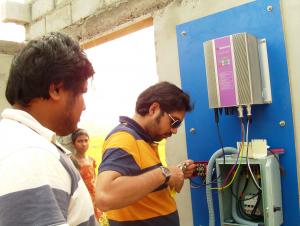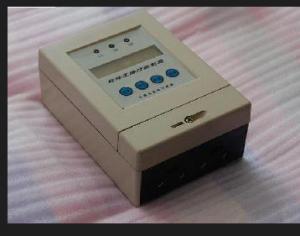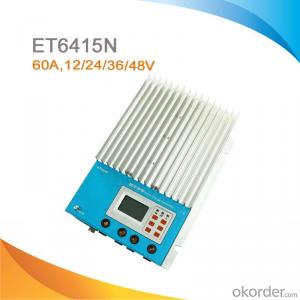Solar Power Charge Controllers - CIS Series (5 – 20 A) Industrial Solar Charge Controller
- Loading Port:
- China Main Port
- Payment Terms:
- TT OR LC
- Min Order Qty:
- -
- Supply Capability:
- 10000 unit/month
OKorder Service Pledge
OKorder Financial Service
You Might Also Like
· Robust Aluminum Housing
· Epoxy Encapsulated PCB to Prevent Corrosion (IP68)
· Compact Size
· Infrared Remote Control Programming Accessory (CIS-CU)
· Intelligent Timer Functions
· Widely Programmable
· External Temperature Sensor
· 4 Stage Battery Charging (Main, Float, Boost, Equalization)
· Dual load or Dimmable Load Output
· Automatic System Voltage Recognition (12/24 V)
· PV-Systems exposed to extreme weather/environmental conditions (street lights, navigation buoys, etc.) have increased risk for damage in the power electronics. In order to assure reliable battery charge control under such conditions, Phocos developed an encapsulated charge controller (IP68) to prevent corrosion: CIS.
· CIS is an industrial-grade charge controller that is suitable for all practical PV applications. High-quality, 4-stage PWM-charging is combined with amazing features such as: low-voltage disconnect, flexible load timer functions, and a multi-LED system status display. CIS is available in two versions:
• Dual load to independently control two loads.
• Output Dimming to save energy in lighting applications.
· The CIS has no moving parts, switches or buttons. Settings such as battery type, deep discharge thresholds, timers, etc. are made quickly and easily via infrared remote control accessory.
· All devices are connected to the controller by supplied lead wires rather than wire terminals. This feature eliminates the risk of damage from external influences (corrosion, dust, water, bugs, chemicals, physical shock) where components make electrical contact to the controller.
· The extremely compact aluminum housing even allows for mounting CIS inside street light poles. CIS was developed in accordance with well-established Phocos standards incorporating the latest technology, highest-quality and best possible cost/performance ratio.
· The CIS family welcomes new members: the CIS-N and CIS-LED. The CIS-N and CIS-LED series have all the great features of the original CIS series, with the added benefit of negative grounding.
· The CIS-N is designed especially for applications in the gas and oil industry, such as remote monitoring, weather stations, valve controlling, SCADA, and many more.
· The CIS-LED combines three functions in one: Charge controller + flexible timer + LED drivers, making it perfect for users of solar LED lamps and solar LED street lights.
- Q: What is the role of a temperature sensor in a solar controller?
- The role of a temperature sensor in a solar controller is to measure the temperature of the solar panels or the surrounding environment. This information is then used by the controller to make decisions and adjustments, such as controlling the flow of energy or adjusting the angle of the panels, to optimize the performance and efficiency of the solar system.
- Q: What is the role of a solar controller in preventing battery freezing?
- The role of a solar controller in preventing battery freezing is to regulate the charging and discharging of the battery based on its temperature. It monitors the battery temperature and adjusts the charging voltage accordingly to prevent overcharging in cold temperatures, which can lead to freezing. By ensuring that the battery is charged at the correct voltage, the solar controller helps maintain the battery's temperature within a safe range, preventing freezing and potential damage to the battery.
- Q: Do solar controllers require regular maintenance?
- Regular maintenance is required for solar controllers. Although they are built to be durable and reliable, it is necessary to perform regular maintenance to ensure optimal performance and longevity. Some common maintenance tasks include cleaning the solar panels to remove dirt or debris that could reduce efficiency, inspecting the wiring and connections for damage or corrosion, and checking the controller's display and settings to ensure proper functioning. It is also recommended to periodically test the system's battery voltage and charge controller settings to ensure they are operating within desired parameters. Regular maintenance not only helps identify potential issues early on but also maximizes the efficiency and lifespan of the solar controller.
- Q: Can a solar controller be used with solar-powered indoor security systems?
- Yes, a solar controller can be used with solar-powered indoor security systems. A solar controller is responsible for regulating the power generated by solar panels and ensuring optimal charging of batteries. Since solar-powered indoor security systems rely on solar energy to operate, a solar controller can effectively manage the power supply and ensure uninterrupted operation of the security system.
- Q: What is the charging current rating of a solar controller?
- The charging current rating of a solar controller is the maximum amount of current it can handle while charging the batteries from the solar panels.
- Q: What is the maximum cable length between the solar panels and the solar controller?
- The maximum cable length between the solar panels and the solar controller depends on various factors such as the type of cable used, the voltage drop tolerance, and the specific system requirements. However, in general, it is recommended to keep the cable length between the solar panels and the solar controller as short as possible to minimize power losses due to resistance in the cables.
- Q: Can a solar controller be used with solar-powered mobile charging stations?
- Yes, a solar controller can be used with solar-powered mobile charging stations. A solar controller is responsible for regulating the voltage and current from the solar panels to ensure optimal charging of batteries or devices. It helps prevent overcharging and damage to the batteries. Therefore, using a solar controller with solar-powered mobile charging stations is recommended to enhance the efficiency and performance of the charging system.
- Q: Can a solar controller be used with a solar panel cleaning system?
- Yes, a solar controller can be used with a solar panel cleaning system. A solar controller is responsible for regulating the power flow from the solar panels to the batteries or grid, ensuring optimal performance and protection. Using a solar controller in conjunction with a solar panel cleaning system can help monitor and control the power output, ensuring efficient cleaning operations without any potential damage to the panels.
- Q: How does a solar controller handle voltage spikes from the solar panels?
- A solar controller is designed to regulate and control the flow of electricity from solar panels to charge batteries or power electrical devices. When it comes to voltage spikes from the solar panels, a solar controller has built-in protection mechanisms to handle and mitigate these spikes. Firstly, a solar controller usually features a Maximum Power Point Tracking (MPPT) system, which constantly monitors and adjusts the voltage and current from the solar panels to ensure maximum power output. This MPPT system helps prevent voltage spikes by continuously tracking the optimal operating point of the solar panels, optimizing their performance and reducing the likelihood of voltage fluctuations. Furthermore, solar controllers typically include overvoltage protection mechanisms. These protection features are designed to detect and limit any voltage spikes that may occur. Once a voltage spike is detected, the controller will automatically activate its protective measures to prevent damage to the batteries or connected devices. This can involve diverting excess voltage to a dump load or temporarily disconnecting the solar panels from the charging system until the voltage returns to safe levels. Additionally, some advanced solar controllers may incorporate surge protection devices or transient voltage suppressors. These components are specifically designed to absorb and dissipate excess electrical energy caused by voltage spikes. By diverting the extra energy away from the system, these devices help safeguard the controller, batteries, and other connected components from potential damage. Overall, a solar controller is equipped with various protective mechanisms to handle voltage spikes from solar panels. These features work in tandem to regulate the incoming voltage, track the maximum power point, and protect the system from any sudden voltage surges. By doing so, the solar controller ensures the smooth and efficient operation of the solar power system while safeguarding its components from potential harm.
- Q: Can a solar controller be used with deep-cycle batteries?
- Yes, a solar controller can be used with deep-cycle batteries. In fact, a solar controller is specifically designed to regulate the charging process of deep-cycle batteries when connected to solar panels. It helps prevent overcharging and extends the battery's lifespan by ensuring a safe and efficient charging cycle.
Send your message to us
Solar Power Charge Controllers - CIS Series (5 – 20 A) Industrial Solar Charge Controller
- Loading Port:
- China Main Port
- Payment Terms:
- TT OR LC
- Min Order Qty:
- -
- Supply Capability:
- 10000 unit/month
OKorder Service Pledge
OKorder Financial Service
Similar products
Hot products
Hot Searches
Related keywords
